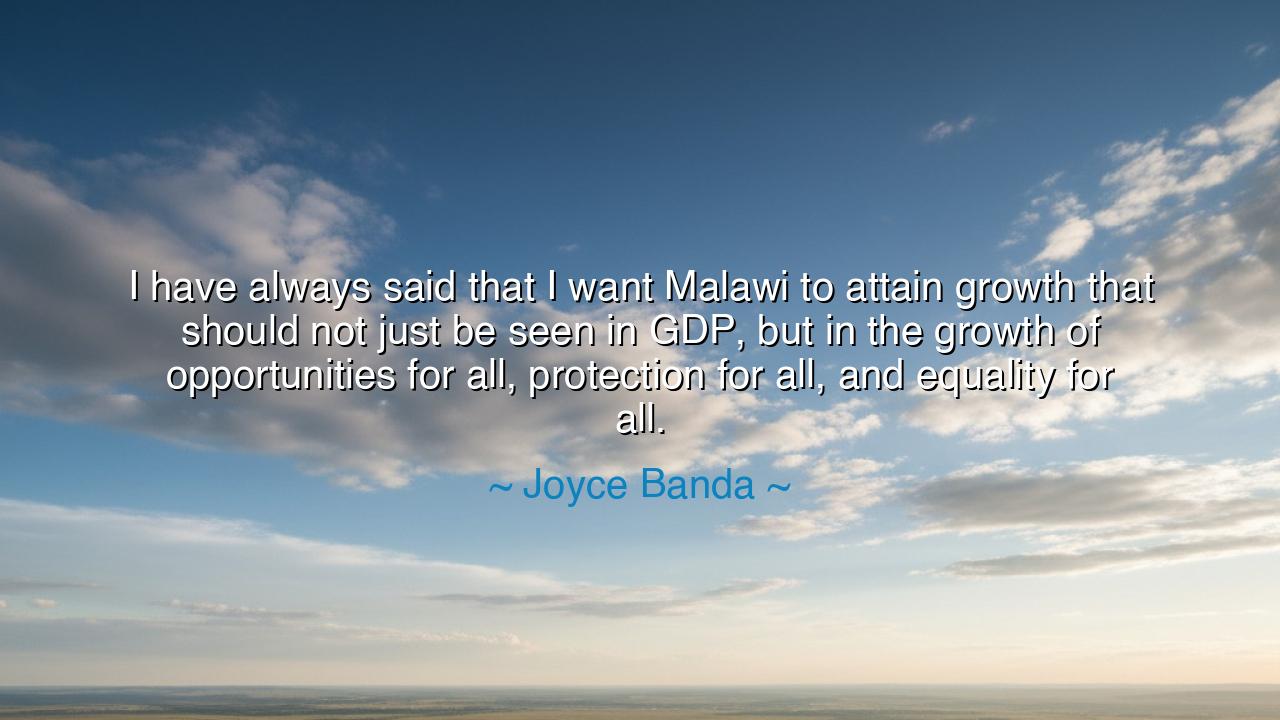
I have always said that I want Malawi to attain growth that
I have always said that I want Malawi to attain growth that should not just be seen in GDP, but in the growth of opportunities for all, protection for all, and equality for all.






Hear, O children of the earth, the voice of Joyce Banda, the woman who rose to lead Malawi in a time of hardship and transition. She declared: “I have always said that I want Malawi to attain growth that should not just be seen in GDP, but in the growth of opportunities for all, protection for all, and equality for all.” This is no small statement, but a vision that reaches beyond numbers and charts, beyond the dry measure of economies, to touch the living fabric of human dignity. For she teaches us that true growth is not merely the swelling of wealth, but the flowering of justice, opportunity, and safety for every soul.
The meaning is profound. Too often nations measure themselves by GDP, by the riches of the few, by the towers in their cities and the treasures in their banks. Yet Banda warns us: such growth is hollow if it does not lift the poor, if it does not open doors for the young, if it does not protect the vulnerable, if it does not bring equality to the neglected. A country may grow rich in coin while its people remain poor in spirit, in opportunity, in hope. True prosperity must be measured not by gold but by the well-being of all.
The origin of her vision lies in her own land, Malawi, a nation scarred by poverty, disease, and inequality. Banda herself knew struggle: before she was president, she endured abuse in her first marriage, yet broke free and became an advocate for women’s rights, education, and economic opportunity. Her life testified to the very principle she proclaimed—that growth must be personal, social, and national, not merely economic. She spoke as one who had lived through chains and chosen freedom, urging her people to imagine an economy that served every citizen, not just the powerful.
History too confirms her wisdom. Consider the story of South Korea in the twentieth century. Once a poor nation ravaged by war, it rose not only through industrial expansion but through investment in education, equality of access, and protection of the vulnerable. Schools were built, women entered the workforce, and opportunities spread across society. The result was not only rising GDP, but also a people strengthened, resilient, and hopeful. Contrast this with lands where wealth grew for a few while the many remained in misery—there, unrest and despair took root, proving Banda’s point: growth without equality is no true growth at all.
Her words carry a moral fire: opportunities for all, protection for all, equality for all. These are not luxuries but necessities if a nation is to endure. For when opportunity is denied, talent is wasted. When protection is withheld, the weak suffer. When equality is ignored, injustice festers like a wound. Banda reminds us that leadership is not about chasing figures to impress the world, but about building a society where every child, every woman, every man can stand tall with dignity.
The lesson is this: measure your success not only in the wealth you gather, but in the lives you touch. Ask not only how much your nation has grown, but who has shared in that growth. Do not be dazzled by numbers while your neighbors remain in hunger or fear. Remember that prosperity without justice is fragile, like a tree with shallow roots. Only when prosperity is joined with equality and protection does it stand firm against the storms of time.
So live, children of tomorrow, by this teaching. In your work, strive not only for gain, but for fairness. In your communities, create opportunities that lift the forgotten. In your nations, demand leaders who see beyond GDP to the beating heart of their people. For in doing so, you will build a prosperity that endures, a growth that belongs to all, and a legacy of justice that future generations will bless. This is the wisdom of Joyce Banda: that true growth is not in numbers but in people, and in their dignity lies the wealth of nations.






AAdministratorAdministrator
Welcome, honored guests. Please leave a comment, we will respond soon